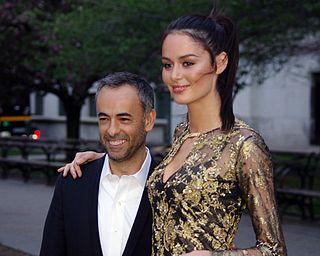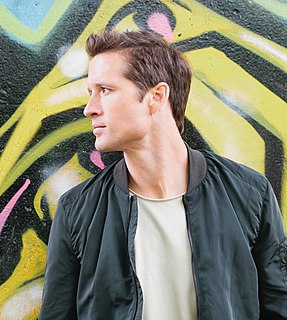A Quote by Robin Sloan
When I'm using the Internet, I have 25 tabs open, and even if somebody sends me... something interesting, odds are I'll forget about it, or it'll get kind of lost in the shuffle.
Related Quotes
I think when you've been in a band for a really long time, sometimes you don't appreciate what's good about yourself. It's easy to play something and get too focused on some small detail. It's helpful to have somebody around who can say, "No, that was good." Just so you don't get too lost or forget what you do. You need somebody you really trust who has great taste.
I think my first general rule is that most of my experiences are not that interesting. It's usually other people's experiences. It's not that entirely conscious. Somebody tells me a story or, you know, repeats an anecdote that somebody else told them and I just feel like I have to write it down so I don't forget - that means for me, something made it fiction-worthy. Interesting things never happen to me, so maybe two or three times when they do, I have to use them, so I write them down.
I'm not the guy who will sit in a room with somebody who's using a bunch of big words and just act like I know what they're talking about, or sit on set with somebody and they'll be trying to explain something and not using layman's terms and I'll just say, "Hey, excuse me, what do you mean by that? Explain to me so I just understand."
You know what your trouble is? You're the kind who always reads the handbook. Anything people build, any kind of technology, it's going to have some specific purpose. It's for doing something that somebody already understands. But if it's new technology, it'll open areas nobody's ever thought of before. You read the manual, man, and you won't play around with it, not the same way. And you get all funny when somebody else uses it to do something you never thought of.
I think it's important for women to have a means to get health care. I think it's important that women have a place to go to get Pap smears and cancer screenings. And it shouldn't be considered extra. It shouldn't be considered something that can be "cut." It shouldn't be something that's in danger of going away. The idea that we're even thinking about cutting that off because somebody else isn't enjoying it themselves or somebody has extreme opinions about it is worrisome to me.
Andy Dufresne: 'That's the beauty of music. They can't get that from you...haven't you ever felt that way about music?' Red: 'I played a mean harmonica as a younger man. Lost interest in it though. Didn't make much sense in here.' Andy: 'Here's where it makes the most sense. You need it so you don't forget.' Red: 'Forget?' Andy: 'Forget that...there are places in this world that aren't made out of stone. That there's something inside...that they can't get to, that they can't touch. That's yours.' Red: 'What're you talking about?' Andy: 'Hope.'
You forget about it, after awhile. You forget that you even have it on. It becomes part of you. You get used to it, even the teeth and the contacts, which bothered the hell out of me. It ends up being something that is part of the role, and part of the thing that you're doing. After awhile, it just feels pretty damn awesome.
When I lost my first record deal, my wife and kids and I lost - I wouldn't say friends, but - we lost a lot people around us. They just vanished! They were nowhere to be found. I couldn't get a break, and I couldn't get people to even respond to my emails about songs, no matter how good something was.
It's glorious to be able to go onto the Internet and hear any kind of music anywhere, from anywhere, and get it instantly. But there's also something glorious about having a record with a sleeve and looking at the artwork, putting it on the turntable and playing it, there's still something romantic to me about that.


































